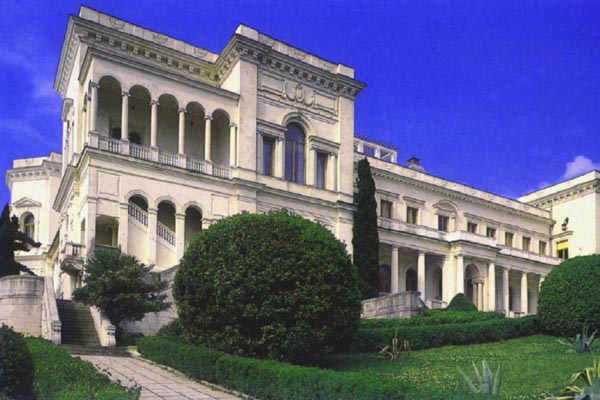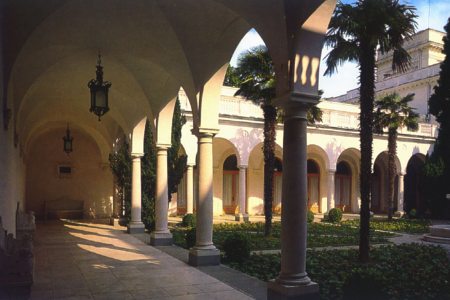
Since 1860 up to 1917 the Livadia Estate was one of the most preferable residences of Alexander II, Alexander III and Nicholas II, and members of their families.
The calm landscape of this part of the Southern Coast of the Crimea, spreading over the slope of Mount Moghabi, facing Yalta, fully justifies its name.
The Livadia Estate was bought by the crown for Alexander II (for the climatic treatment of his wife, Empress Maria Alexandrovna) and by the Emperor's Decree was presented to her as a gift, and was under her administration.
The first owner of the Livadia Estate, Empress Maria Alexandrovna, was an intelligent woman and a highly educated person. As a child, she was simply brought up and early evinced love for music and literature. She married the Crown Prince Alexander Nikolayevich in 1841 and bore him six sons and two daughters. Up to the moment of her husband's accession in 1855 no one ever imagined that he would be known to posterity as a great reformer. The Empress understood her husband and gave him her support in the desire to revive Russia.
In 1861 the august family came to Livadia. The Crimea fascinated the Empress, Livadia in particular. They saw the sights of Yalta and the region, took a keen interest in the mode of life of the natives, attended a wedding ceremony in a Tartar (in Greek means "meadow" or "glade"). Tr.
village and a divine service in a Greek Church, met and spoke to the ordinary people. In short, they were imbued with new unusual impressions.
It was decided to replenish the estate and the task was assigned to the famous St. Petersburg architect Ippolite Monighetti.
During a period of four years (1862-1866) the architect, collaborating with the Gardener Clement Hekkel, created the magnificent palace-cum-garden ensemble, comprising various buildings serene and majestic in their radiant whiteness contrasting the greenery of the park.
Time has not spared the Grand and Lesser Imperial Palaces, the Ladies-in-Waiting's House. The Suite House and the Conservatory were frequently renovated and altered, losing their original appearance. There are but a few buildings that have survived untouched - the Gardener's House, the Stables, several fountains and the Turkish Summer-House, a symbol of Livadia. And the Church of the Exaltation of the Cross (Ippolite Monighetti, architect) stands on an elevation, being in plan a typical Byzantine-style church, i. e., a Greek cross inscribed in a square.
Arriving in the Crimea in 1867, the Empress highly estimated the immense attraction of the palace, its sides bristling with pine-clover, an exceedingly picturesque and romantic park sloping down to the shore, the sea with its even murmur, cool breeze and endless horizon. Now

Maria Alexandrovna longed to go south to stay in her "sweet Livadia" till late autumn and not only because of her doctors' orders.
It is quite natural that when the Emperor lived in Livadia, the estate turned into a centre of political and cultural life of Russia. Ministers, diplomats and highly-honoured foreign guests came to meet the Emperor. Famous artists, writers, actors who were born to no titles, but achieved fame by their own energy and their own genius, were guests of the august family.
In July, 1867, on a fine Crimean morning the beautiful side-wheel steamship Quaker City steamed down to the foot of the Yalta harbour and anchored.
"Among our excursionists", as Mark Twain (pen name of Samuel Langhorne Clemens) put it in his The Innocents Abroad, were ministers of the Gospel, doctors, military and naval officers with sound titles, "were an ample crop of 'Professors' of various kinds and a gentleman (Mark Twain - Ãã.) who had 'Commissioner of the United States of America to Europe, Asia and Africa' after his name". The Americans were invited to the Livadia Estate to pay the Emperor of Russia a visit.
A dinner was served on the centre-tables in the Reception Room and the verandas of the Grand Palace. The Russian nobility escorted them over the grounds and the illustrious host moved from place to place and helped to keep the conversation lively.
To quote from Mark Twain's original, "We have been in no country yet where we have been so kindly received and where we have felt that to be Americans was a sufficient visa for our passports... If you know Russia you know that was a wild stretch of hospitality."
The sickly Empress died in the summer of 1880 and a few weeks afterwards Alexander II was united in the morganatic marriage with Princess Yekaterina Mikhailovna Dolgorukaya-Yuriyevskaya, with whom he had had intimate relations. The autumn months they spent in Livadia were filled with quiet joy and happiness.
 Since 1860 up to 1917 the Livadia Estate was one of the most preferable residences of Alexander II, Alexander III and Nicholas II, and members of their families.
The calm landscape of this part of the Southern Coast of the Crimea, spreading over the slope of Mount Moghabi, facing Yalta, fully justifies its name.
Since 1860 up to 1917 the Livadia Estate was one of the most preferable residences of Alexander II, Alexander III and Nicholas II, and members of their families.
The calm landscape of this part of the Southern Coast of the Crimea, spreading over the slope of Mount Moghabi, facing Yalta, fully justifies its name. Maria Alexandrovna longed to go south to stay in her "sweet Livadia" till late autumn and not only because of her doctors' orders.
It is quite natural that when the Emperor lived in Livadia, the estate turned into a centre of political and cultural life of Russia. Ministers, diplomats and highly-honoured foreign guests came to meet the Emperor. Famous artists, writers, actors who were born to no titles, but achieved fame by their own energy and their own genius, were guests of the august family.
In July, 1867, on a fine Crimean morning the beautiful side-wheel steamship Quaker City steamed down to the foot of the Yalta harbour and anchored.
Maria Alexandrovna longed to go south to stay in her "sweet Livadia" till late autumn and not only because of her doctors' orders.
It is quite natural that when the Emperor lived in Livadia, the estate turned into a centre of political and cultural life of Russia. Ministers, diplomats and highly-honoured foreign guests came to meet the Emperor. Famous artists, writers, actors who were born to no titles, but achieved fame by their own energy and their own genius, were guests of the august family.
In July, 1867, on a fine Crimean morning the beautiful side-wheel steamship Quaker City steamed down to the foot of the Yalta harbour and anchored.